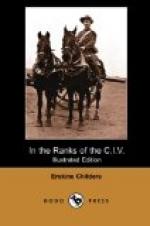take a spoonful, when you find the centres tying themselves
up in a knot with the leaders. Up you get, straighten
them out, and sit down again. After two more spoonfuls,
you find the wheelers playing cat’s-cradle with
the centres’ traces. Perhaps the wheel-driver
is asleep, and you get up and put them right.
Then the grazing operations of the leaders bring them
round in a circle to the wheelers. Up you get,
and finally, as the fifth spoonful is comforting a
very empty stomach, you hear, “Stand to your
horses!” “Mount!” You hurriedly
stuff the tin into a muzzle hanging from the saddle,
where you have leisure to observe its fragrant juices
trickling out, stick the spoon under a wallet-strap,
buckle up wither-straps, and mount. At the next
halt you begin again, and the same thing happens.
It is a positive relief to hear the shriek of a shell,
and have something definite to do or interest you.
About two the 38th fired a few shots at some Boers
on the sky-line, and then we came to Waterval, where
we camped and watered. The Petersberg railway
runs up here, and this was a station on it, with a
few houses besides. Its only interest is the
cage in which several thousand English prisoners were
kept, till released by Roberts’ arrival.
I visited it on the way to a delicious bathe in the
river after tea. It is a large enclosure, full
of the remains of mud huts, and fitted with close rows
of tall iron posts for the electric light, which must
have turned night into day. It is surrounded
by an elaborate barbed-wire entanglement. In
one place was a tunnel made by some prisoners to escape
by. It began at a hole inside a hut, and ran underground
for quite forty yards, to a point about five yards
outside the enclosure. Some of our chaps passed
through it. In a large tin shed near the enclosure
was a fine electric-lighting plant for lighting this
strange prison on the open veldt.
This morning the Captain came back, to our great delight.
He had been away since Winberg, getting stores for
us at Bloemfontein. He brought a waggon full
of clothing and tobacco, which was distributed after
we had come in. There were thick corduroy uniforms
for winter use. If they had reached us in the
cold weather they would have been more useful.
It is hot weather now; but a light drill tunic was
also served out, and a sign of the times was stewed
dry fruit for tea. The ration now is five biscuits
(the full ration) and a Maconochie, or bully beef.
Only extreme hunger can make me stomach Maconochies
now. They are quite sound and good, but one gets
to taste nothing but the chemical preservative, whatever
it is. We have had no fresh meat for a long time
back, but one manages with an occasional change of
bully beef or a commandeered chicken.
The camp is a big one, for infantry reinforcements
have come in, and two cow-guns.




